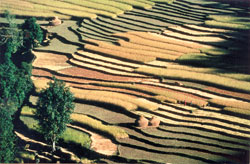 CK Lal's State of the State column ('Food for thought', #318) pressing the government to invest more in agriculture reinforces the myth that agricultural development to increase crop productivity is the panacea that will lift Nepalis out of poverty. For fifty years, governments have invested lavishly in this, basing poverty reduction strategies on farm inputs. And they've failed.
CK Lal's State of the State column ('Food for thought', #318) pressing the government to invest more in agriculture reinforces the myth that agricultural development to increase crop productivity is the panacea that will lift Nepalis out of poverty. For fifty years, governments have invested lavishly in this, basing poverty reduction strategies on farm inputs. And they've failed.
But this has been like an elephant giving birth to a mouse. Farmers know they're doomed if they depend on the land and are looking for full employment. And because there are no jobs here, they must migrate abroad.
Developing agriculture and reducing rural poverty are separate things. There are connections, but there has to be clarity on the main goal: decreasing poverty or increasing farm output.
Reduction of poverty calls for full employment for the poor with decent wages. Developing agriculture won't lead to full employment for any significant part of the rural poor. Even in California, farms depend on poor Mexicans. Generations of these migrant workers have remained poor as they depended on the seasonal employment on gringo farms. In Nepal, fragmented landholdings make poverty reduction through farm employment even more difficult.
Foreign employment, in contrast, is regular and provides better income. Remittances from Nepali workers abroad bring in more money every year than all foreign aid to this country combined. And unlike aid, a lot of this money goes directly into the village economy.
Comparable income and employment from agriculture will need vast investment and a paradigm shift in the way this country is run. Agriculture is, after all, a culture. Developing agriculture is developing a culture of adapting to the modern global economy. Are we up to it?
It is also an economic activity with fierce competition. So far, the government's investment in agriculture rarely reaches the farmers. Most agriculture projects are designed by non-farmers for the benefit of non-farmers. The World Bank-designed, financed, and supervised irrigation project, the Bhairahawa Lumbini Groundwater Project is a case in point. Increase in income from the project is limited to those in the feeding frenzy, project staff and government officials.
Longterm benefits include the access roads built for moving giant American drilling rigs around the project sites, and the electricity grid put up to power the water pumps. As for irrigation, the main aim of the whole show, hardly anyone uses the water. The project was just extended after an 'exhaustive' evaluation. There was no hue and cry, no heads rolled, no political party spoke out.
Under the WTO, Nepal has opened its market to imported foodstuffs. But try to export Nepali agricultural produce to India and it's as if Nepali tea, ginger, or vegetables were potential bio-weapons.
Opening foreign markets is difficult and takes much skill and dedication, if not outright muscle power. After all, one job producing products for export is potentially one job less in the importing country. We're yet to see serious effort to open foreign markets, even the less sophisticated Indian market, for our agriculture produce.
In its present setup, our state can't deliver resources to develop farming. Asking the rural poor to wait for the development of agriculture to lift them out of poverty is a cruel joke. The only solution to poverty is generating real jobs, and because local investment is so low, employment abroad is the only short-term hope.
To really reduce poverty, the government should reduce the expense and hassle for those wishing to work abroad. It should negotiate to increase the salary levels of Nepalis abroad. But given past bungling, perhaps the best thing the government can do is nothing, and allow foreign employment to grow on its own.
Kabindra Pradhan is a farmer in Butwal.


